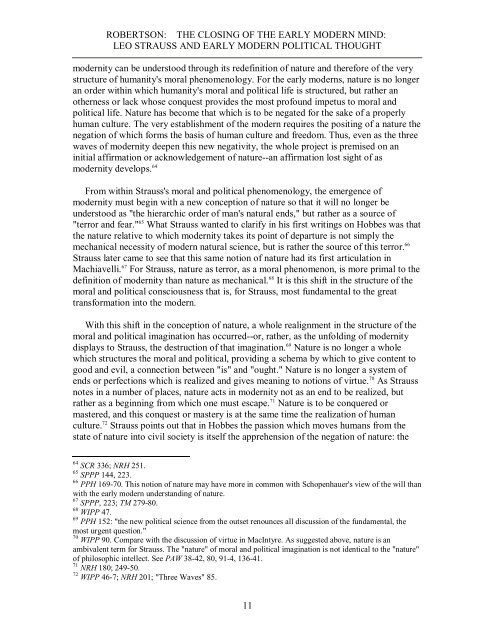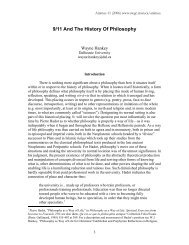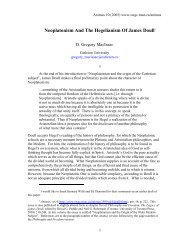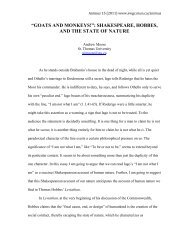Leo Strauss And Early Modern Political Thought
Leo Strauss And Early Modern Political Thought
Leo Strauss And Early Modern Political Thought
Create successful ePaper yourself
Turn your PDF publications into a flip-book with our unique Google optimized e-Paper software.
ROBERTSON: THE CLOSING OF THE EARLY MODERN MIND:LEO STRAUSS AND EARLY MODERN POLITICAL THOUGHTmodernity can be understood through its redefinition of nature and therefore of the verystructure of humanity's moral phenomenology. For the early moderns, nature is no longeran order within which humanity's moral and political life is structured, but rather anotherness or lack whose conquest provides the most profound impetus to moral andpolitical life. Nature has become that which is to be negated for the sake of a properlyhuman culture. The very establishment of the modern requires the positing of a nature thenegation of which forms the basis of human culture and freedom. Thus, even as the threewaves of modernity deepen this new negativity, the whole project is premised on aninitial affirmation or acknowledgement of nature--an affirmation lost sight of asmodernity develops. 64From within <strong>Strauss</strong>'s moral and political phenomenology, the emergence ofmodernity must begin with a new conception of nature so that it will no longer beunderstood as "the hierarchic order of man's natural ends," but rather as a source of"terror and fear." 65 What <strong>Strauss</strong> wanted to clarify in his first writings on Hobbes was thatthe nature relative to which modernity takes its point of departure is not simply themechanical necessity of modern natural science, but is rather the source of this terror. 66<strong>Strauss</strong> later came to see that this same notion of nature had its first articulation inMachiavelli. 67 For <strong>Strauss</strong>, nature as terror, as a moral phenomenon, is more primal to thedefinition of modernity than nature as mechanical. 68 It is this shift in the structure of themoral and political consciousness that is, for <strong>Strauss</strong>, most fundamental to the greattransformation into the modern.With this shift in the conception of nature, a whole realignment in the structure of themoral and political imagination has occurred--or, rather, as the unfolding of modernitydisplays to <strong>Strauss</strong>, the destruction of that imagination. 69 Nature is no longer a wholewhich structures the moral and political, providing a schema by which to give content togood and evil, a connection between "is" and "ought." Nature is no longer a system ofends or perfections which is realized and gives meaning to notions of virtue. 70 As <strong>Strauss</strong>notes in a number of places, nature acts in modernity not as an end to be realized, butrather as a beginning from which one must escape. 71 Nature is to be conquered ormastered, and this conquest or mastery is at the same time the realization of humanculture. 72 <strong>Strauss</strong> points out that in Hobbes the passion which moves humans from thestate of nature into civil society is itself the apprehension of the negation of nature: the64 SCR 336; NRH 251.65 SPPP 144, 223.66 PPH 169-70. This notion of nature may have more in common with Schopenhauer's view of the will thanwith the early modern understanding of nature.67 SPPP, 223; TM 279-80.68 WIPP 47.69 PPH 152: "the new political science from the outset renounces all discussion of the fundamental, themost urgent question."70 WIPP 90. Compare with the discussion of virtue in MacIntyre. As suggested above, nature is anambivalent term for <strong>Strauss</strong>. The "nature" of moral and political imagination is not identical to the "nature"of philosophic intellect. See PAW 38-42, 80, 91-4, 136-41.71 NRH 180; 249-50.72 WIPP 46-7; NRH 201; "Three Waves" 85.11
















